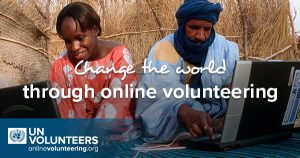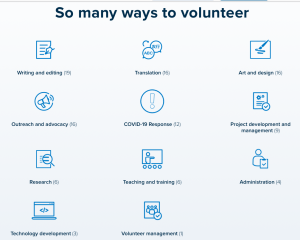Globalization has brought about a new dimension to our lives since everything is to hand in this shrinking world where technology is making a real difference (for the better?). However, when you think of volunteering, the first image that springs to mind is this stereotype of young and idealistic Westerners who, eager to live the real story, embark themselves in a fascinating overseas adventure. (I beg the reader’s pardon, perhaps I should have written down voluntourism instead of volunteering).

Evidently, this is the volunteering paradox, while half of the world population has adhered to the sustainability cause and the planet is going to the dogs, our youth insists on flying to the remotest places with the purpose of preserving what the carbon emissions have miraculously spared. As wisely explained in Helena’s thought-provoking post, volunteering overseas is not always the best option when there is so much to do at home…
But in terms of development, the real thing is that ICTs matter. Certainly, many aspects concerning social change have been dramatically improved (or worsened?) by the implementation of new technologies that have an evident impact on related issues such as social advancement, communication, transparency and accountability, to name but a few. What is more, ICTs have allowed organizations to ameliorate their working procedures and attain a higher level of efficiency in the usage of limited resources. Hence, why not volunteer from home taking advantage of ICTs? At first glance, it is the obvious recipe to square the circle of volunteering and sustainable development.

Among other initiatives, I would like to mention UN Online Volunteering (UNV), an institutional collaborative action-oriented project which allows individuals worldwide to ‘virtually’ contribute to sustainable human development with an emphasis on ICT4D and which, according to website information, is fast, easy and above all effective…, and what is more, makes it possible to engage in a humanitarian cause from any device and any location in the world.

In addition, the initiative enables the collaboration of people from all walks of life, with different languages, levels of education and backgrounds due to the diversity of the tasks that require a good deal of popular participation. Therefore, anybody with basic computer and Internet abilities is welcome to apply for an opportunity of putting their skills into action.
With regards to limitations, it is clearly understandable that online volunteering does not work for everything, even though there are some general rules to facilitate its implementation (learn more here) which might well be summarized into two pieces of advice: take care of the volunteers and encourage teamwork.
From a theoretic point of view, online volunteering could be classified into any of the three different sub-categories which, according to Roberts’ post, make up digital development. Indeed, there is digital in development as it helps carry out digital in-house work, digital for development owing to the ICT savvies whose expert collaboration contributes to creating new apps and technological tools aimed at achieving social change, and last but not least, development in a digital world as an unstoppable outcome of ongoing digitalization in both developed and developing countries. So, why should not the volunteer jump on the online bandwagon of development when engaging in humanitarian action?

But if the potential volunteer is still not completely convinced, there are plenty of opportunities (see here) beyond UN social change projects or national cooperation agencies which could fulfil their expectations and fit their capabilities at one’s virtual fingertips. No matter the altruistic will, there is always an online way to donate some virtual time to a humanitarian cause which, at the end of the day, it is some of a two-bird stone: doing good while aligning with sustainable environmental goals.
The Covid19 crises and a final reflection
From the outset of the Covid19 outbreak, social distancing has been regarded as one of the most powerful practices to prevent disease transmission and spare lives. Among other measures, teleworking has proved to be effective as a means of avoiding unnecessary contacts and somehow relieve the pressure on the public transportation system where most contagions occurred in urban agglomerations have taken place.
Furthermore, the problematic of volunteering during the pandemic is two-fold. In the first place, the volunteers’ safety has become a nightmare for governments which have limited means to monitor and repatriate their nationals and second, the arrival of Westerners to the Global South has accelerated the epidemic in many countries, where the volunteers have worked as vectors of the disease.
Needless to say, the pandemic has given rise to a new understanding of globalization and many of us have started to reflect on how our lifestyle is affecting the fragile planetary equilibrium which is dangerously approaching an irreversible tipping point. (Whether you believe me or you do not, just watch this eye-opening Johan Rockström’s TED Talk).
Does it add up if we carry on travelling to such distant countries and putting their local population at risk when we do not dare to cross our own neighbourhood at home? My final reflection just boils down to a simple slogan coined by the founder of Friends of the Earth:
“Think globally, act locally (David Brower 1971)”





